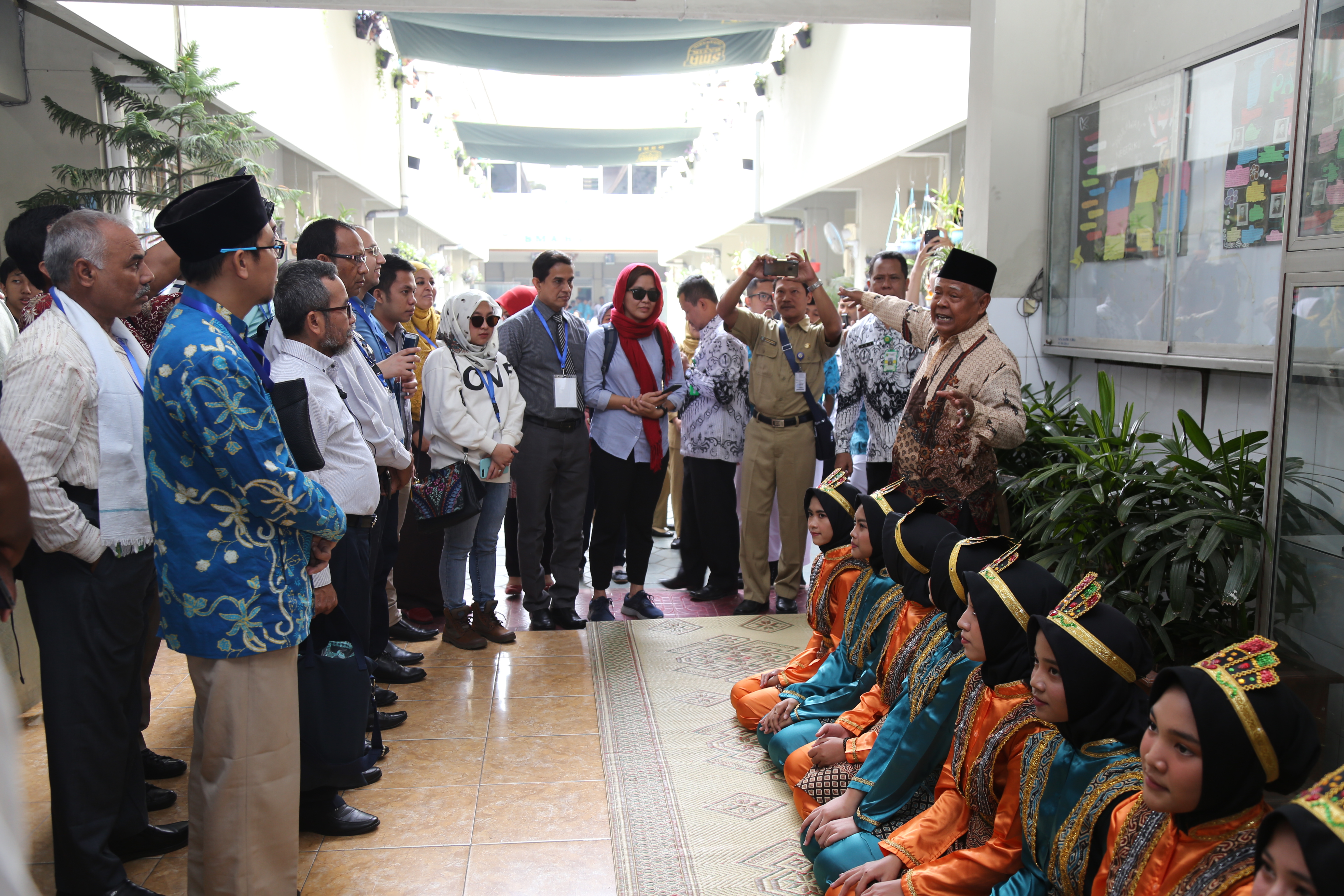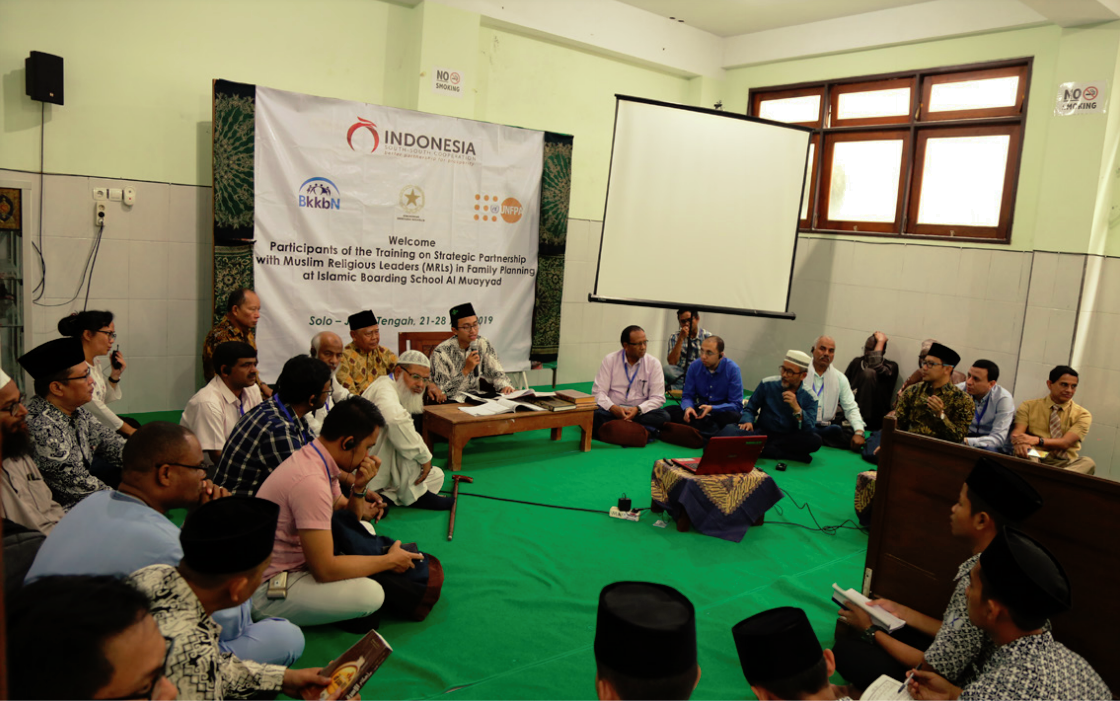 Muslim Religious Leaders Engage in Local Family Planning Actions
Indonesia’s leadership efforts to improve family planning programmes in predominantly Muslim Districts.
Muslim Religious Leaders Engage in Local Family Planning Actions
Indonesia’s leadership efforts to improve family planning programmes in predominantly Muslim Districts.

Challenges
Many Islamic countries or regions with majority Muslim population are facing problems with low participation in family planning programmes. The average contraceptive prevalence rate (CPR) among members of the Organization of Islamic Cooperation (OIC) is 36%, a rate much lower than that of the world average of 63%. Nepal belongs to the lower end of this CPR spectrum. Its Hindu majority population started its family planning programme in the late 1960s, but the CPR has remained at 43% in the last fifteen years. The non-use of FP contraceptives and the unmet need for FP is higher in Nepali ethnic minorities such as Dalits and Muslims. It is lowest in the Muslim community of Kapilvastu District, but still at 26%. These communities also have the highest incidence of poverty in the country.
Towards a Solution
Under this initiative, the government of Indonesia provides technical assistance to the government of Nepal to improve the adoption of family planning among its predominantly Muslim Districts. This partnership is part of an on-going South-South and Triangular Cooperation (SSTC) on Strategic Partnership with Muslim Religious Leaders (MRLs) in Family Planning organized by BKKBN – the National Population and Family Planning Board, and the Ministry of State Secretariat, with technical assistance from UNFPA. This collaboration has been ongoing since 2013 but is expected to end in 2020 with a possible extension into 2021-25.
Indonesia, with a population of around 267 million in 2018, has the biggest Muslim population in the world. Unlike other developing countries with predominantly Muslim populations, Indonesia has an advanced family planning programme. The total fertility rate decreased from 5.6 in the 1970s to 2.28 in 2015. The CPR according to the Indonesian Demographic and Health Survey (IDHS) of 2017 was 57% for modern contraceptive methods and 63% for all methods. Unmet need for family planning is at 10.6%. The Indonesian family planning programme has been considered among the success stories in the world, largely attributed to the commitment and support from the highest religious leaders of the country.
The two biggest Muslim organizations in Indonesia: Nahdatul Ulama and Muhammadiyah have endorsed fatwas on family planning as early as in 1968 and 1969 respectively, highlighting that family planning is in line with Islamic principles. The Indonesian Council of Ulamas (MUI) also endorsed several fatwas on contraceptive methods. Women Muslim organizations have also educated their members on family planning through Majlis taklim Islamic gatherings. Hospitals owned by Islamic institutions provide family planning services including long-term methods such as IUD, male and female sterilization.
As a part of this programme, Indonesia regularly provides 20-25 scholarships yearly to other developing countries. Since its start in 2013, Indonesia’s SSTC has supported the participation of 231 participants from 22 countries in Asia and the Africa, including 16 Muslim religious leaders and 10 government officials from Nepal.
The collaboration with Nepal focuses on involving MRLs in designing country action plans and working with them at community levels. Using three different languages for simultaneous interpretation – English, Arabic and French – the SSTC employs innovative teaching-learning methodologies and expert resource persons to discuss concepts and Islamic teachings about family planning. The programme, which also includes field outreach and interaction with local Muslim leaders has increased its relevance at grassroots levels.
The action plan developed with Nepal, under this collaboration, has been transformed into a four-year project, subsequently funded by DFID and initiated in December 2016. The programme reaches out to the ulamas, men and women from Muslim community to disseminate family planning-related messages. In 2019 alone, a total of 175 community-based Muslim leaders were oriented on the Islamic perspectives on family planning.
As a result of this engagement, the uptake of family planning among the Muslim communities has increased almost two-fold in 2019 compared to 2017. In 2017, UNFPA Nepal invited Indonesian MRLs and officers to facilitate a first ever national level workshop on family planning that was attended by ulamas and government officials. In addition, a book entitled “Family Planning, Reproductive Health, and Gender: Islamic Perspective” developed by UNFPA Indonesia and BKKBN, has been translated into Nepali language and now being used by MRLs for community level orientation. To date, MRLs from Kapilvastu district have launched a five-point declaration to promote family well-being within their community, calling it a ‘‘Khusahal Parivar Approach” meaning, a Happy Family Approach. This has encouraged marginalized ethnic and religious minorities to prosper in four key dimensions - education, health, nutrition and finances in order to attain a happy family life. This SSC has further reduced the stigmatization of family planning in local Muslim communities.
Contact Information
Countries involved
Supported by
Implementing Entities
Project Status
Project Period
URL of the practice
Primary SDG
Secondary SDGs
Similar Solutions
| NAME OF SOLUTION | Countries | SDG | Project Status | |
|---|---|---|---|---|
A Billion Brains: Smarter Children, Healthier Economies High Level Meeting on South-South Cooperation for Child Rights |
Indonesia, Nepal | 17 - Partnerships for the Goals | Completed | View Details |
A-Card Initiative |
Indonesia, Nepal | 10 - Reduced Inequalities | Completed | View Details |
Accelerating Digital Transformation in All Ministries in Bangladesh Promoting the rapid design and implementation of plans to digitize all ministries and subordinate government institutions in Bangladesh |
Indonesia, Nepal | 10 - Reduced Inequalities | Ongoing | View Details |
Accelerating the Implementation of African Union Treaties in São Tomé and Príncipe South-South learning from the Beninese judicial system’s experience in the application of human rights treaties to its national law |
Indonesia, Nepal | 05 - Gender Equality | Completed | View Details |
Accelerating the Transformational Shift to a Low-Carbon Economy in Mauritius Towards supplying 35 percent of the country’s energy needs with renewables by 2025 |
Indonesia, Nepal | 05 - Gender Equality 09 - Industry, Innovation and Infrastructure 13 - Climate Action | Ongoing | View Details |

